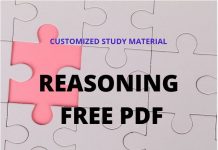English Quiz On Phrasal Verb and connector Questions
Day 4 Bag
Buy Quant & Reasoning Tricks Book – Buy Now
Direction: In the following exercise, a part of the given sentences is underlined. Find out the meaning of the underlined phrase or word.
He frequently goes back on his words.
- repeats his words
- confuses others
- stumbles
- breaks his promise
I cannot make out what you say.
- rely upon
- believe
- understand
- solve
The officer wanted to stave off an open battle.
- postpone
- wait and see
- allow to take its own course
- prevent
No one but his conscience advised him to come back to earth.
- return home
- return to earth
- return to reality
- be honest
Rakesh takes after his parents.
- follows
- imitates
- obeys
- resembles
The country’s economy has begun to look up now.
- remain static
- improve
- look clear
- go down
He cannot put up with his nasty son.
- control
- endure
- forgive
- appreciate
To look quickly through a book is an important study skill.
- to skim
- to summarise
- to outline
- to paraphrase
As she was turning out some papers she came across the information she had been searching for.
- saw from distance
- found unexpectedly
- touched
- read quickly
She tries very hard to keep up with her rich neighbours.
- to imitate
- to keep touch
- to avoid
- to be on par
- d. breaks his promise
- c. understand
- c. allow to take its own course
- a. return home
- d. resembles
- b. improve
- b. endure
- b. to summarise
- b. found unexpectedly
- a. to imitate
Directions (1-10): In the following questions, a part of the sentence (a word or a phrase) has been highlighted in bold. four different ways of writing the word or phrase has been given in the options (b), (c), (d) and (e). Find the correct replacement of the given bold word or phrase. If the given word or phrase is grammatically correct, then select option (a). Option (a) repeats the same word or phrase.
Q1. Carnivorous mammals can endure what would otherwise be lethal levels of body heat because they have a heat-exchange network which kept the brain from getting too hot.
(a) which kept
(b) that keeps
(c) which has kept
(d) that has been keeping
(e) having kept
Q2. The commission has directed advertisers to restrict the use of the word “natural” to foods that do not contain color or flavor additives, chemical preservatives, or nothing that has been synthesized.
(a) or nothing that has been
(b) or that has been
(c) and nothing that is
(d) or anything that has been
(e) and anything
Q3. The Iroquois were primarily planters, but supplementing their cultivation of maize, squash, and beans with fishing and hunting.
(a) but supplementing
(b) and had supplemented
(c) and even though they supplemented
(d) although they supplemented
(e) but with supplementing
Q4. As contrasted with the honeybee, the yellow jacket can sting repeatedly without dying and carries a potent venom that can cause intense pain.
(a) As contrasted with the honeybee,
(b) In contrast to the honeybee’s,
(c) Unlike the sting of the honeybee,
(d) Unlike that of the honeybee,
(e) Unlike the honeybee,
Q5. None of the attempts to specify the causes of crime explains why most of the people exposed to the alleged causes do not commit crimes and, conversely, why so many of those not so exposed have.
(a) have
(b) has
(c) shall
(d) do
(e) could
Q6. The end of the eighteenth century saw the emergence of prize-stock breeding, with individual bulls and cows receiving awards, fetching unprecedented prices, and excited enormous interest whenever they were put on show.
(a) excited
(b) it excited
(c) exciting
(d) would excite
(e) it had excited
Q7. For members of the seventeenth-century Ashanti nation in Africa, animal-hide shields with wooden frames were essential items of military equipment, a method to protect warriors against enemy arrows and spears.
(a) a method to protect
(b) as a method protecting
(c) protecting
(d) as a protection of
(e) to protect
Q8. Scientists have recently discovered what could be the largest and oldest living organism on Earth, a giant fungus that is an interwoven filigree of mushrooms and rootlike tentacles spawned by a single fertilized spore some 10,000 years ago and extending for more than 30 acres in the soil of a Michigan forest.
(a) extending
(b) extends
(c) extended
(d) it extended
(e) is extending
Q9. Quasars, at billions of light-years from Earth the most distant observable objects in the universe, believed to be the cores of galaxies in an early stage of development.
(a) believed to be
(b) are believed to be
(c) some believe them to be
(d) some believe they are
(e) it is believed that they are
Q10. Five fledgling sea eagles left their nests in western Scotland this summer, bringing to 34 the number of wild birds successfully raised since transplants from Norway began in 1975.
(a) bringing
(b) and brings
(c) and it brings
(d) and it brought
(e) and brought
Solutions
S1. Ans.(b)
Sol. The use of the past tense (kept) is incorrect because a current situation is discussed; the present tense (keeps) is consistent with the other verbs in the sentence. In (a) and (c), which introduces a restrictive clause. Some writers follow the convention that which can only be used for nonrestrictive clauses, but insistence on this rule is controversial, and both (a) and (c) can be rejected on other grounds.
Hence, B Correct. The verb keeps indicates a current situation and is consistent with the other verbs in the sentence. The sentence is clear and concise.
S2. Ans.(d)
Sol. The use of ‘do not’ and ‘nothing’ in the same sentence creates a double negative and reverse the intended meaning. ‘Anything’ should be used instead of ‘nothing’. Logically, a “natural” food cannot contain any prohibited ingredient, so the list of prohibited ingredients must be connected by or.
D Correct. This sentence correctly avoids a double negative and uses parallel elements.
S3. Ans.(d)
Sol. The participle supplementing would normally be expected to modify the first clause, describing or extending its meaning, but the logic of this sentence demands a contrast, not an extension. Consequently, the second part of the sentence must be revised to emphasize the contrast properly. The logic of the sentence also argues against a construction that would set the two clauses and the importance of their content equal when they clearly should not be. The best solution is to have the main clause describe the primary activity, and a subordinate clause, although they supplemented, describe the supplementary activity.
D Correct. Using although creates a subordinate clause in this sentence and logically links that clause with the main clause; the simple past supplemented parallels the simple past were.
S4. Ans.(e)
Sol. The intent of the sentence is to contrast the honeybee and the yellow jacket. Correct idioms for such a contrast include in contrast with x, y, in contrast to x, y; and unlike x, y. In all these idioms, x and y must be grammatically and logically parallel. As contrasted with is not a correct idiom.
E Correct. This sentence uses a correct idiom, and the honeybee is properly parallel to the yellow jacket.
S5. Ans.(d)
Sol. The sentence compares one group of people, most of the people exposed to the alleged causes, with another group of people, so many of those not so exposed. To maintain the comparison, the verb in the second part should match the verb in the first part. Since the first verb is do not commit, the second verb should be the parallel ‘do’. There is no need to repeat commit crimes since it is understood in this construction.
D Correct. This sentence correctly uses the verb ‘do’ to complete the comparison and maintain the parallelism with ‘do not commit’.
S6. Ans.(c)
Sol. The bulls and cows are described in a series of participial phrases. Items in a series should be parallel: receiving awards is parallel to fetching unprecedented prices, but excited must be changed to exciting to make the third phrase, exciting enormous interest, parallel to the first two.
C Correct. In this sentence, exciting is parallel to receiving the fetching.
S7. Ans.(c)
Sol. The bold part of the sentence begins a phrase describing items of military equipment. It is awkward and inaccurate to describe items themselves as a method. Replacing the bold phrase with the participle protecting creates a modifying phrase that clearly explains the purpose of the items of military equipment.
C Correct. In this sentence, protecting properly introduced a modifying phrase revealing the purpose of the items.
S8. Ans.(a)
Sol. The original sentence is correctly written. The giant fungus is described as an interwoven filigree spawned … some 10,000 years ago and extending for more than 30 acres. The present participle extending parallels the past participle spawned.
A Correct. This sentence has the participles spawned and extending in a correct parallel construction. Spawned refers to something that happened in the past. Which extending refers to something that continues into the present.
S9. Ans.(b)
Sol. The original sentence is not actually a sentence; it is a sentence fragment since it lacks a verb: believed to be on its own is a participial phrase. The verb ‘are’ must be placed before ‘believed to be’ to create a complete sentence.
B Correct. The verb believed to be grammatically completes the sentence and connects quasars to cores.
S10. Ans.(a)
Sol. ‘Bringing’ is the present participle of the verb ‘to bring’. As used here, it correctly describes an action that happens at the same time as the action in the main clause; ‘bringing’ indicates that the number of wild birds became 34 when the five eagles left their nests.
A Correct. The participle bringing correctly links the two ideas in the sentence.
I came across these old photos when I was tidying the closet.
1.came towards
2.came behind
3.came upfront
4.came along
5.No correction
Answer – 5.No correction
Explanation :
Came across (something/someone) – find or meet unexpectedly.
I am counting at you to make dinner while I am out.
1.counting in
2.counting over
3.counting on
4.counting out
5.No correction
Answer – 3.counting onExplanation :
Counting on someone – rely or depend on someone.
My doctor wants me to cut over on sweets and fatty foods.
1.cut up
2.cut back
3.cut out
4.cut along
5.No correction
Answer – 2.cut back
Explanation :
Cut back – an act of reducing something.
A large number of ATM cards have never being used even once by the Jan Dhan account holders.
1.never being used
2.never will be used
3.never been using
4.never been used
5.never being using
Answer: D
Answer – 4.never been used
Explanation :
‘Being’ is used as a verb for continuous tense when the sentence is written in passive voice, but the sentence is not in continuous tense here, it is Present Perfect. So, replace being with ‘been’ and use 3rd form of verb – ‘used’. Hence the answer D.
My boyfriend didn’t want to go to the ballet, but he finally agreed in.
1.rested in
2.drove in
3.gave in
4.gave away
5.No correction
Answer – 3.gave in
Explanation :
Give in – cease fighting or arguing; admit defeat
We are going up against the best soccer team in the city tonight.
1.going against
2.going in battling
3.going down fighting
4.going towards
5.No correction
Answer – 5.No correction
Explanation :
Going up against – To confront; face; challenge
Ever since your dad saw me stealing that chocolate bar he has looked into me.
1.threatened on
2.looked down on
3.hated up on
4.looked across
5.No correction
Answer – 2.looked down on
Explanation :
Look down upon – to regard with contempt , despise, loathe etc.
It was so hot in the church that an elderly lady passed in.
1.went in
2.passed over
3.fell out
4.passed out
5.No correction
Answer – 4.passed out
Explanation :
Pass out – faint or collapse; become unconcious.
We are phasing out our trip until January because of the hurricane.
1.putting out
2.cracking out
3.putting off
4.panning out
5.No correction
Answer – 2.cracking out
Explanation :
Put off – to postpone.
I don’t think I can put up with three small children in the car.
1.cope up with
2.handle up
3.put on with
4.check out with
5.No correction
Answer – 5.No correction
Explanation :
Put up with (someone) – tolerate, endure etc
The Prime Minister had to climb up over his tax proposals because there was so much opposition from the members of his own party.
1) climb down
2) climb on
3) climb with
4) climb at
5) No correction required.
Answer & Explanation
Answer – 1)
Explanation : ‘climb down’ is the correct use. “climb down” means “Accept that you are wrong and change your position.”
I spent the whole weekend Clear away the attic as it was full of papers and other junk.
1) clear off
2) clear out
3) clear up
4) clear on
5) No correction required.
Answer & Explanation
Answer – 2)
Explanation : ‘clear out’ is the correct use. “clear out (clearing out)” means “Tidy up thoroughly and throw away unwanted stuff.”
The banks have closed down a lot of branches in villages over the last few years.
1) closed off
2) close out
3) close through
4) close away
5) No correction required.
Answer & Explanation
Answer – 5)
Explanation : No correction required. “closed down” means “Close a shop, branch or business permanently.”
If you get behind by mortgage payments, you might lose your home.
1) clouded apart
2) clouded in
3) clouded away
4) get behind with
5) No correction required.
Answer & Explanation
Answer – 4)
Explanation : ‘Get behind with ’ is the correct use. “Get behind with ” means “Be late paying instalments for something”
They’re finding it increasingly difficult to get through since their daughter was born.
1) get down
2) get by
3) get by with
4) get by on
5) No correction required.
Answer & Explanation
Answer – 2)
Explanation : ‘get by’ is the correct use. “get by” means “Have just enough money to live on.”
She came out with the answer when everyone was expecting it to remain unsolved.
1) came out on
2) came out in
3) came out through
4) came out along
5) No correction required.
Answer & Explanation
Answer – 5)
Explanation : No correction required. “come out with” means “Say something publicly and unexpectedly”
When they had finished dinner, the children asked if they could get out.
1) coming towards
2) get down
3) coming through
4) coming by
5) No correction required.
Answer & Explanation
Answer – 2)
Explanation : ‘get down ’ is the correct use. “get down ” means “Leave the table after eating.”
News is coming within of a major accident on the M25, where freezing fog has been making driving conditions extremely dangerous.
1) coming through
2) coming around
3) coming across
4) coming over
5) No correction required.
Answer & Explanation
Answer – 1)
Explanation : ‘ coming through’ is the correct use. “ coming through” means “Arrive (messages and information). ”
I’ll be late home tonight because something’s come to at work has to be ready for tomorrow morning.
1) come into
2) come over
3) come down
4) come up
5) No correction required.
Answer & Explanation
Answer – 4)
Explanation : ‘come up’ is the correct use. “come up” means “Appear.”
Nobody could come up with a satisfactory explanation for the accident.
1) came up about
2) came up by
3) came in to
4) came with the
5) No correction required.
Answer & Explanation
Answer – 5)
Explanation : No correction required. “come up with” means “Think of a solution, excuse, etc.”












